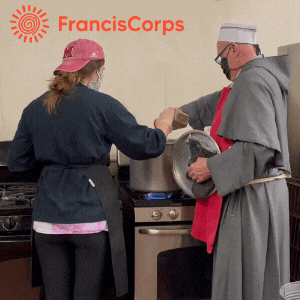By Jen Coe, Lasallian Volunteer 12-13
Place of Service: Martin De Porres, Queens, NY
Jen Coe is from Monte Sereno, CA. She graduated from the University of Notre Dame in 2012 with a B.A. in Psychology.
I try to make it to weekday mass before work. One day recently, father spoke of self-possession. “We must fully possess ourselves to fully give ourselves.” For me, these words could not ring more true.
My service year thus far has been one of immense growth, complete with intense growing pains (I went from 5’4” to nearly 5’9” in middle school and I remember complaining to my father how much my knees and legs were hurting). Until mass that day, I didn’t connect that I’ve been learning, trial-by-fire, the important relationship between self-possession and self-gift.
With my job as case manager at a residential high school for emotionally disturbed teenage boys, I can’t afford to live a life of extremes. I know what it’s like to go to work with little sleep (awful), I know what it’s like to go to work unprepared (stressful) and I know what it’s like to go to work in a bad mood (disastrous). This year is a crash-course in how to be an adult – I cannot get away with the disorganization that characterized my life for three-and-a-half of my four years of college. Then, I lived only for myself. Now, I have a duty to my community and to my students. I live for nineteen wild teenage boys, and whether or not they see or appreciate it, I need to be at my best every minute that I am at work. Self-possession, or self-discipline, is an important skill I am trying to acquire for the sake of myself and those I serve.
 Social service is a field that demands one to continually give of oneself. You give your time and attention to students with issues like, “I have a toothache and my mom’s insurance card isn’t working, can you make me an appointment?” to “I feel abandoned by my family and don’t want to be in this place” to irate calls from parents, to surprise visits from state agencies.. One is constantly giving time and attention to all types of people and situations.
Social service is a field that demands one to continually give of oneself. You give your time and attention to students with issues like, “I have a toothache and my mom’s insurance card isn’t working, can you make me an appointment?” to “I feel abandoned by my family and don’t want to be in this place” to irate calls from parents, to surprise visits from state agencies.. One is constantly giving time and attention to all types of people and situations.
Self-discipline may have too much of an ascetic, medieval tone to it, but it is so very important for good work. I need to sleep. I need to smile and listen to others even when I don’t feel like smiling or listening. I need to do my paperwork in a timely manner. I need to read my work email instead of browsing the internet. I need to make sure I have time with friends so that I can be in a place of peace and happiness for my work. I need to model how to live a good life, so that when I give my students a hard time for playing 18 hours of video games over the weekend or for not communicating respectfully with their parents, I am not picking out their splinter in their eyes while the plank is in my own.
We learn more from what people do than what they say. Our world is inundated with words, most of them pretty useless. Actions are more powerful, and someone who does what he or she preaches is the kind of person I might stop and listen to.
 Our faith has the most beautiful image of love: Jesus on the cross. That example of pure love, of most unselfish self-gift, moves me to action more profoundly than any words of a thoughtful hallmark card, any viewing of the Notebook, any poem of Elizabeth Barrett Browning (and I enjoy EBB!). Love in our faith is a dying to oneself for the sake of others and God. If I fully possess myself, I have grown in my ability to die constantly to myself. And if I have created that habit within, then I can more freely love and give to those around me.
Our faith has the most beautiful image of love: Jesus on the cross. That example of pure love, of most unselfish self-gift, moves me to action more profoundly than any words of a thoughtful hallmark card, any viewing of the Notebook, any poem of Elizabeth Barrett Browning (and I enjoy EBB!). Love in our faith is a dying to oneself for the sake of others and God. If I fully possess myself, I have grown in my ability to die constantly to myself. And if I have created that habit within, then I can more freely love and give to those around me.



 Thousands of faith-based service opportunities can be at your fingertips with the RESPONSE. Download the latest edition today!
Thousands of faith-based service opportunities can be at your fingertips with the RESPONSE. Download the latest edition today!
